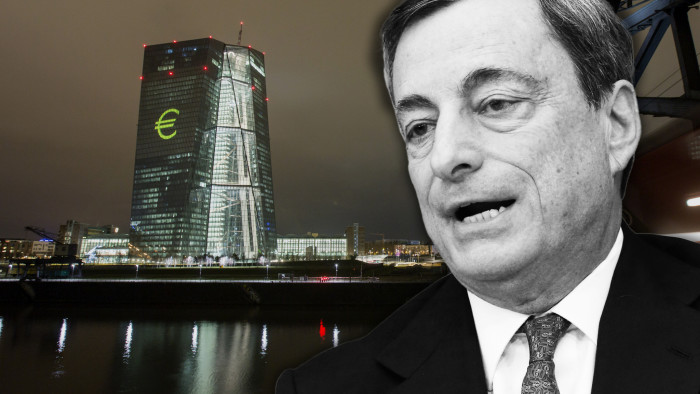Draghi awaits data on ECB’s bet on eurozone strength

Simply sign up to the Eurozone economy myFT Digest -- delivered directly to your inbox.
When the European Central Bank decided last month to call time on the €2.5tn bond buying spree that has provided the core of its crisis response, Mario Draghi, president, and his team knew they were taking a risk. Now they are waiting for the data that will show whether the ECB was reckless at a time when threats to the economy are mounting.
After a surprisingly strong 2017, the eurozone economy has begun to sputter. Amid signs of a slowdown, tensions between the US and the rest of the world threaten to turn into a full-blown trade war that would prove especially damaging for the eurozone, a region that depends heavily on exports for growth. Relations with the UK are also uncertain. Business is uneasy.
“There is the risk of a hard Brexit and the threat of a global trade war. Any kind of distortion will disturb our business,” said Henrik Meincke, chief economist at the VCI, the trade body for the German chemicals industry, who emphasises the importance of open markets for his sector.
The question hanging over the ECB is whether the eurozone’s rocky first quarter was a blip or a harbinger of a more serious downturn.
The bank’s decision last month to halve the size of its bond purchases to €15bn a month in September and phase them out entirely after December indicates that it takes a relatively sanguine view of the first-quarter data.
But by the time the bank’s governing council starts its deliberations on Thursday — its last monetary policy meeting before the autumn — two pieces of data will have given further indication about the extent of the region’s economic problems.
A poll of purchasing managers, the PMI, seen as a bellwether for the pace of economic activity, is out on Tuesday. On Wednesday, Ifo, an influential Munich-based think-tank, will publish its index of the German business climate, which has fallen in recent months on the back of concerns over trade: few places are more at risk from a trade war than the region’s economic powerhouse.
A further key piece of data will come at the end of the month, with confirmation of whether the slowdown in growth from 0.7 per cent in the final three months of 2017 to 0.4 per cent at the opening of this year continued over the spring.
If growth remains lacklustre, the ECB will face questions on whether it was wise to declare an end to a policy that is widely credited with reviving the region’s economic fortunes, before being able to make a proper call on how severe the slowdown will be.
Most economists nevertheless believe that the ECB’s bet will pay off and that growth will have recovered in the second quarter.
The Bundesbank, Germany’s powerful central bank, said on Monday that the German economy was likely to have improved in the three months to the end of June.
The monthly Nowcast index, which estimates the pace of growth in the eurozone, has indicated that there has been some pick-up in recent months — even if 2018 is set to bring slower growth than in 2017.
Lucrezia Reichlin, a professor at London Business School who helps put the index together, said: “The Nowcast suggests that the recent improvements in conditions is broad and should continue. Although recent data have corrected the negative signal of the beginning of the year, 2018 will have lower growth than 2017 — the recovery has peaked.”
She added that, despite the risks to growth, the ECB was right to change tack on its quantitative easing asset purchase programme. “It is fair to say that [QE] can distort conditions in financial markets, and given the health of the economy the ECB can probably go back to using interest rates as the primary policy tool.”
Peter Bofinger, an economics professor at the University of Würzburg and a member of German chancellor Angela Merkel’s council of economic experts, said: “Monetary policy is still loose across much of the world, austerity is a thing of the past in most places, and there are few signs of imminent danger in financial markets.
“You have to differentiate between positive economic fundamentals and the political risks. Of course those political risks could override the fundamentals, but I don’t see that happening right now.”
Comments